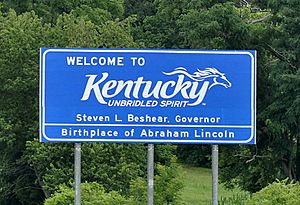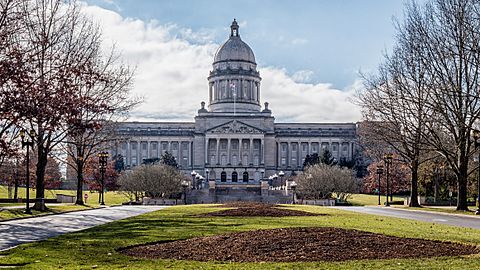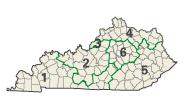Government of Kentucky facts for kids

|
|
| Part of | United States of America |
|---|---|
| Constitution | Constitution of Kentucky |
| Legislative branch | |
| Name | General Assembly |
| Type | Bicameral |
| Meeting place | Kentucky State Capitol |
| Upper house | |
| Name | Senate |
| Presiding officer | Robert Stivers, President |
| Lower house | |
| Name | House of Representatives |
| Presiding officer | David Osborne, Speaker |
| Executive branch | |
| Head of State and Government | |
| Title | Governor |
| Currently | Andy Beshear |
| Appointer | Election |
| Cabinet | |
| Leader | Governor |
| Deputy leader | Lieutenant Governor |
| Headquarters | Kentucky State Capitol |
| Judicial branch | |
| Courts | Courts of Kentucky |
| Kentucky Supreme Court | |
| Chief judge | Debra H. Lambert |
| Seat | Covington, Kentucky |
The government of the Commonwealth of Kentucky is set up by the Kentucky Constitution. It has three main parts, called branches. These branches are the Executive, Judicial, and Legislative. Each branch has different jobs to make sure the state runs smoothly and fairly.
Contents
Executive Branch: Leading Kentucky

The Executive branch is led by the Governor. The Governor is like the chief executive officer of the state. They are both the head of state and the head of the government. The Lieutenant Governor also works in this branch. They usually run for office together with the Governor.
Before 1992, the Lieutenant Governor would take over if the Governor left the state. Now, the Lieutenant Governor only takes on the Governor's duties if the Governor cannot do their job. The Governor and Lieutenant Governor are elected for four-year terms. The current Governor is Andy Beshear, and the Lieutenant Governor is Jacqueline Coleman. Both are members of the Democratic Party.
The Executive branch is organized into different "cabinets." Each cabinet focuses on a specific area and is led by a secretary. These secretaries are also part of the Governor's main team. This system was started in 1972 to help organize many government groups that used to report directly to the Governor.
Here are some of the cabinets:
- General Government Cabinet
- Transportation Cabinet
- Cabinet for Economic Development
- Finance and Administration Cabinet
- Tourism, Arts, and Heritage Cabinet
- Education and Workforce Development Cabinet
- Cabinet for Health and Family Services
- Justice and Public Safety Cabinet
- Personnel Cabinet
- Labor Cabinet
- Energy and Environment Cabinet
- Public Protection Cabinet
Other important elected officials in Kentucky include the Secretary of State, who handles official records. The Attorney General is the state's top lawyer and law enforcement officer. There is also an Auditor of Public Accounts, a State Treasurer, and a Commissioner of Agriculture. These officials help run different parts of the state government.
Legislative Branch: Making Laws
Kentucky's Legislative branch is called the Kentucky General Assembly. It is a two-house body, meaning it has two parts.
The Senate is known as the "upper house." It has 38 members. The leader of the Senate is called the President of the Senate. Currently, this is Robert Stivers from the Republican Party.
The House of Representatives is the other part. It has 100 members. The leader of the House is called the Speaker of the House. The current Speaker is David Osborne, also from the Republican Party.
In November 2016, the Republican Party gained control of the House for the first time since 1922. They now have a large majority of members in both the House and the Senate.
Judicial Branch: Interpreting Laws
The Judicial branch in Kentucky is called the Kentucky Court of Justice. It includes several types of courts:
- District Courts: These handle smaller cases.
- Circuit Courts: These handle more serious cases.
- Family Courts: These are special courts for family matters.
- Kentucky Court of Appeals: This court reviews decisions from lower courts.
- Kentucky Supreme Court: This is the highest court in Kentucky.
The Kentucky Court of Justice is led by the Chief Justice of the Commonwealth. The Chief Justice is an elected member of the Kentucky Supreme Court. The current Chief Justice is Debra H. Lambert. She is the first woman to hold this important position in Kentucky.
Unlike judges at the national level, who are often appointed, judges in Kentucky's state courts are chosen by voters in elections.
Kentucky's Role in the U.S. Government
Kentucky also has representatives who work in the United States government.
- U.S. Senators: Kentucky has two U.S. senators. They are Mitch McConnell and Rand Paul, both Republicans. Mitch McConnell is currently the leader of the minority party in the Senate.
- U.S. Representatives: The state is divided into six areas called congressional districts. Each district elects one person to represent them in the U.S. House of Representatives. Most of Kentucky's representatives are Republicans, including James Comer (1st District), Brett Guthrie (2nd District), Thomas Massie (4th District), Hal Rogers (5th District), and Andy Barr (6th District). The 3rd District is represented by Democrat Morgan McGarvey.
In the national court system, Kentucky has two main United States district courts. One is for the eastern part of Kentucky, based in Lexington. The other is for the western part, based in Louisville. If someone wants to appeal a decision from these courts, the case goes to the United States Court of Appeals for the Sixth Circuit, which is located in Cincinnati, Ohio.
Laws in Kentucky

Kentucky's laws are collected and organized in something called the Kentucky Revised Statutes (KRS). This system was created in 1942 to make all of Kentucky's laws clearer and easier to understand.
These laws are enforced by different police officers. This includes local police, sheriffs and their deputies, and constables and their deputies. Most of these officers must complete special training at the Kentucky Department of Criminal Justice Training Center. In 1948, the Kentucky General Assembly created the Kentucky State Police. This police force has authority throughout the entire state.
Kentucky is one of the states that allows the death penalty for certain very serious crimes.
Kentucky has also been part of discussions about displaying religious symbols on public property. For example, there have been court cases about showing the Ten Commandments in courthouses. In one case, the U.S. Supreme Court said a display of only the Ten Commandments was not allowed. In another case, a court said a display that included the Ten Commandments along with other historical documents like the Mayflower Compact and the Declaration of Independence could be put up.
Kentucky is known for having some unusual age requirements for people running for political office. The reason for this is not fully known, but some think it relates to old state traditions.
 | Frances Mary Albrier |
 | Whitney Young |
 | Muhammad Ali |



